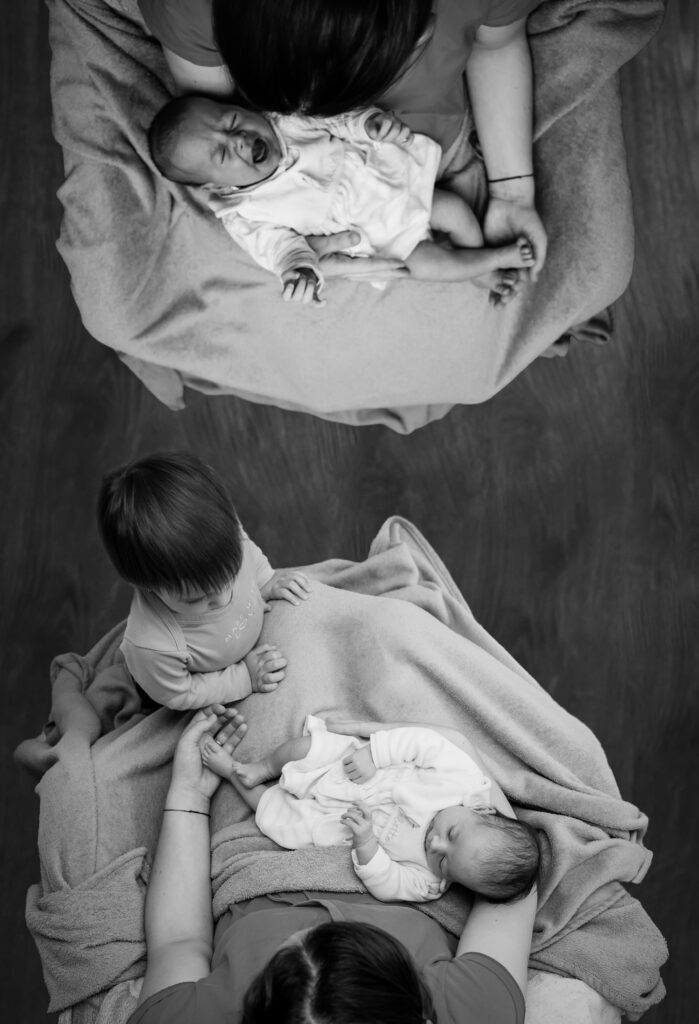A balanced diet during pregnancy provides the building blocks for growing a new life inside you (make that two for twin pregnancies).
An expectant person’s diet chart has direct consequences on the yet-to-be-born baby’s growth and development.
But pregnancy myths continue to circulate, especially around twin pregnancies. These bring out the superstitious nature of even the most pragmatic person.
There are a lot of dos and don’ts associated with a pregnant person’s food habits, and in this article, we will bust the most common twin pregnancy myths and highlight the facts. First, let’s lay out the significance of myths and food habits.

Pregnancy Myths Vs Food Habits
All pregnancies are special, and most of them can be many things – exciting, nerve-wracking, confusing, difficult, and complicated to name a few. But once you know you are on your way to welcoming twins, you need to unlearn and relearn everything from scratch.
And that is when you become more inquisitive and open to pregnancy myths. It’s easy to get confused with so much information floating around.
Most of these myths come from assumptions and pregnancy patterns, such as food cravings associated with the sex of the baby, or body changes linked with the number of conceptions.
If this is your very first pregnancy, you must pay attention to your overall health, and not be distracted by myths and superstitions.
The most important factor is to take care of your health and well-being. You’re going to hear many strange things during and after your pregnancy. Remember, your pregnancy is your personal journey, and your goal should be to be in a positive headspace.
For any pregnancy-related concerns, you should consult your doctor.
In the following section, we will feature the most common twin pregnancy myths and food habits. At least, you’ll have a practical guideline to follow when it comes to maintaining a healthy lifestyle and guarding your sanity!
1. All Pregnancies Begin With Twins
One of the more bizarre false beliefs is that all pregnancies begin with twins. The concept is derived from pregnancy in people over 30 years old, which has some truth to it.
Some scientific evidence from renowned organizations such as the UK NHS (National Health Service) has confirmed that some pregnancies do begin as twins, but in most cases, one of the embryos does not make it – which is widely known as vanishing twin syndrome.
2. Twin Pregnancies are Rare
If you compare the chances of single-birth pregnancies with twin pregnancies, it is quite rare. If you look at the numbers closely, in the U.S, there were 128,310 twins born in 2017, which is 3.3% of total births.
Although, twin pregnancies are rising, as many parents are now conceiving in their late 30s or 40s.
3. Certain Foods Increase Chances of Conceiving Twins
Some myths revolve around food habits for women trying to increase their chances of conception.
Yams, for example, are known to be one of those items that are thought to increase the chances of having twins. Eating yams to have twins is a concept that is related to hyperovulation, where more than one egg is released, and if successful, it can cause fraternal twin pregnancies only.
The scientific truth is that white yams contain natural hormones, meaning they have the ability to increase levels of phytoestrogen in women, making it easier for them to experience hyperovulation.
Keep in mind that it’s important to get your pregnancy nutritionist’s approval before you incorporate any out-of-the-ordinary food item into your pregnancy diet.
4. Eating Twin Bananas May Lead to Twins
This is an old myth that has traveled across the world and exists in many variations in different cultures. Some people believe that eating bananas regularly can increase the chances of conceiving twins, while others believe that feeding twin bananas to an expectant parent will lead to twin pregnancies.
However, this myth has no scientific evidence. Bananas are healthy to consume during pregnancy, and that should be the only reason to incorporate it into your pregnancy diet.
5. You’re Eating for Three
You have two growing lives inside you, and that makes three of you. And most people insist on tripling the calorie count based on the number of people you are having to feed.
Healthcare professionals only advise increasing 300 to 350 calories from the second trimester, and it can double to 700 calories for twins, but definitely not three times what you normally consume.
Eating for three people can in fact cause serious health issues during your third trimester, and trigger birth complications.
6. Twins Skip a Generation
One very popular myth is that fraternal twins skip a generation, but there’s no proven truth to the statement. Fraternal twins are a result of two separate eggs from two different sperm in the same pregnancy.
There can be a pattern found in many families, but again, there’s no such scientific rule around it.
7. Identical Twins Have One Placenta and Fraternal Have Two
As mentioned above, fraternal twins grow from two different eggs. Identical twins, on the other hand, develop from one single fertilized egg that separates into two embryos.
Ideally, fraternal twins produce two placentas, while identical twins share just one. Although, there are cases when identical twins are also born with two separate placentas.
The truth is that the number of placentas cannot 100% confirm if the twins are fraternal or identical.
8. You’ll Have Really Bad Morning Sickness
There is a myth that twin pregnancies cause really bad morning sickness; however, there is no scientific proof of this.
A recent study found that some single pregnancies showed signs of worse morning sickness in comparison to twin pregnancies.
9. You Gain Double the Weight
With twin pregnancies, many people tell you that you’re going to end up gaining double the weight.
Well, it’s your OB’s job to monitor your weight gain, regardless of the number of babies you are carrying. Ideally, it is healthy for pregnant people to gain 25 to 35 pounds, and in the case of twin pregnancies, it can go up to 50 pounds (give or take). This is definitely not double the weight.
Tracking your pregnancy weight is crucial, as it can lead to birth complications. It’s wise to speak to your doctor about any concerns you may have.
10. Twins Have Telepathy
This one is the most superstitious twin pregnancy myth that exists in every part of the world.
Twins being telepathic or having a way to communicate via parapsychological processes is a concept that has no scientific evidence.
11. Twins Equal Double Work
This is clearly factual because more children mean more work for parents.
With two children of the same age, you have to make double the effort in caring for them. Double food, double bathing, and double the care.
12. Twin Pregnancy Means Smaller Babies
Doctors often talk about premature deliveries or smaller babies during twin pregnancies. This is because, in more than 50% of cases, twins are born early and/or smaller.
Most expectant parents with twins give birth before reaching full term, somewhere between 35 to 37 weeks. A full-term pregnancy is 40 weeks from conception. However, some people have given birth to full-term twins, of weight.
13. Twins Can Only Be Born Via C-Section
This particular myth about giving birth via c-section to twins is subjective. There are many elements that one needs to consider.
Many people have given birth to twins via c-section because they were overwhelmed by the thought of two consecutive deliveries.
Another common reason for pregnant people to consider a c-section is that twins may unpredictably switch positions before delivery, making it hard to give vaginal birth.
Delivery methods depend on multiple factors like health conditions, babies’ position, the heart rate of the mother and babies, and more. So, it is difficult to conclude that twin babies are only born via c-section.
Conclusion
There’s no shortcut to consuming balanced meals and choosing a healthy lifestyle during pregnancy, whether you’re expecting twins or not.
Your quality of life will highly impact your babies’ physical growth and brain development. You should not delay any diet-related or physical concerns, rather speak to your doctor and make changes accordingly.
There are many other factors to consider for parents-to-be, such as sleep patterns, a positive mindset, and an active lifestyle.
All these pregnancy essentials will help you fulfill your pregnancy health checklist for sure.






